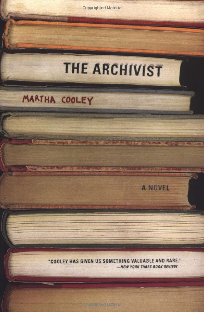books
Books like The Archivist
The Archivist
This book created a dark sense. Not noir, but a sense of foreboding and of something evil lurking. I'm a sucker for that. Witness my liking Donna Tartt's The Secret History, which many of my Facebook friends turn up their noses at. Apparently that makes me want to find out *what is going on.* The story is of a young couple who marries in 1945. She's a poet. He's a librarian (the archivist of the title). He's a Christian, she a Jew. He can't accept what she's going through as everybody learns what happened during the Holocaust, and he can't tolerate looking too closely at it himself. So he tries to block her preoccupation and stifle her creativity on the subject. Although he believes he's protecting her, he's defending himself. Already he subtly looks down on her religion. She gradually falls apart and gets institutionalized for good (which is like nothing that happens today). This parallels what happened in T.S. Eliot's relationship with his wife, so snippets of his and other poetry are part of the narrative.The book is about how the husband failed the wife in his ability to relate to her.The book is also about the impact of their faith traditions on what happens. Not only is the husband the male, but also he's part of the dominant religious tradition of their locale. The book has some flaws. As I put in some of my comments there was some confusion of dates and ages. That's important because it's a little bit of a challenge to keep the people straight. The young couple is of the "greatest generation," i.e., those who were of age to fight in WWII. That makes them the age of my parents, but for many readers, it would be the age of their grandparents. Different events happen along the line that relate to where they are in history. For example, the wife goes into the hospital in 1959, in her 40s. Meanwhile the present (in the novel) is the 1980s, when the husband is in his mid-60s. One of the mistakes would have added another five years onto his age, but being in his 70s during the present day action would have been even less plausible. I say that because he seems a little too young for his 60s -- except that since I'm in mine, of course I'm young at heart - ha!The male protagonist's character is a little off, as though the author couldn't do men just right. Both my husband and I arrived at that conclusion independently.The religious attributions are a little odd. Since both the male and female are utterly without community, then it could mean each had arrived at idiosyncratic beliefs. I think you'd have to say that to make sense of it. Also, I think the author leaves the impact from the male's religious attitudes not just subtle but underdeveloped.The author perhaps couldn't make up her mind or didn't know whether the woman's mental illness was something that would have happened anyway or whether it was in response to relationship issues, religious factors, and the times. The author didn't make a clear case for either one of those, so that took away from her point.And I wish a little more had been done with Eliot's poetry. I'm not much of a poetry aficionado, so I could have used that. I have heard that Eliot had antisemitic tendencies, but whether they impacted what he wrote I don't know, and it didn't seem to have anything to do with the story.All that being said, the book did lend itself to discussion of the issues at hand, even though the author's portrayal of them was through a glass darkly.It didn't bother me that their lives paralleled those of Eliot and his wife. Some Goodreads reviewers thought that seemed contrived, but they are probably very young and don't know how strange life is!I will say that this book was recommended by a clergyman-scholar involved in an interfaith foundation who thought it would be a good book for interfaith couples to read. In that respect, I just wish it hadn't had the woman going down the tubes!I would have probably given this book three stars, except that my husband and I read it together. What we put into it raised it to a "4."

Filter by:
Cross-category suggestions
Filter by:
Filter by:
Filter by:
Filter by:
Filter by:
Filter by:
Filter by:
Filter by: